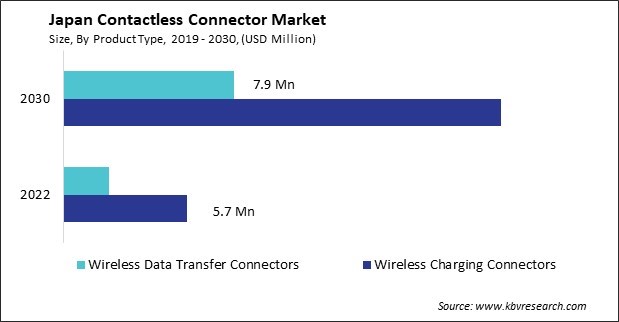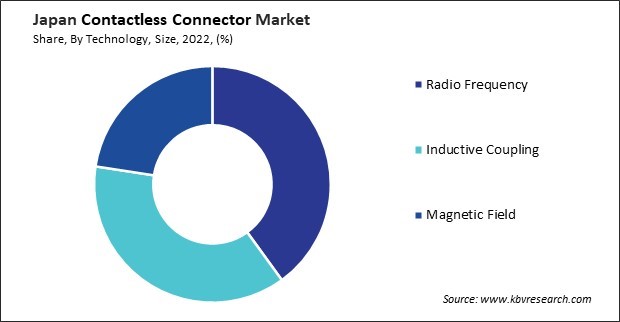The Japan Contactless Connector Market size is expected to reach $28 Million by 2030, rising at a market growth of 17.6% CAGR during the forecast period.
The contactless connector market has witnessed significant growth and innovation in Japan in recent years. One key driver of the contactless connector market in Japan is the rapid expansion of the automotive industry. As automotive manufacturers strive to integrate advanced electronic systems into vehicles to enhance safety, efficiency, and connectivity, the demand for reliable, high-performance contactless connectors has surged. These connectors facilitate communication between vehicle components, such as sensors, control units, and infotainment systems.

In addition, the consumer electronics industry in Japan has emerged as a significant industry for contactless connectors. With the proliferation of smartphones, tablets, wearable devices, and other portable gadgets, there is a growing need for compact and lightweight connectors that withstand frequent use and offer seamless connectivity. Furthermore, the industrial automation sector in Japan has embraced contactless connectors to enhance operational efficiency and productivity.
However, the COVID-19 pandemic has also posed challenges for the contactless connector market in Japan, particularly regarding supply chain disruptions and manufacturing delays. The global semiconductor shortage has affected the production of contactless connector components, leading to supply constraints and longer lead times for manufacturers. Additionally, travel restrictions and social distancing measures have hampered the deployment of contactless connector solutions, particularly in industries such as transportation and hospitality.
The adoption of electric vehicles (EVs) in Japan has been steadily rising, catalyzing a corresponding surge in the demand for contactless connectors, also known as wireless charging systems. One of the primary drivers behind the increasing popularity of electric vehicles in Japan is the government's strong push for environmental conservation and reducing greenhouse gas emissions. In alignment with global efforts to combat climate change, Japan has implemented stringent regulations and incentives to promote adopting eco-friendly transportation solutions.
Furthermore, Japanese automakers have been at the forefront of developing cutting-edge electric vehicle technologies, driving consumer confidence in the reliability and performance of EVs. Companies like Nissan, Toyota, and Honda have made significant strides in advancing battery technology, extending the driving range of electric vehicles and enhancing charging efficiency.
According to the Japan Automobile Dealers Association (JADA), sales of new electric vehicles in 2020 reached close to 1.4 million. New electric vehicles accounted for 36.2% of total new car sales, up from 35.2% in 2019. The robust demand for hybrid electric vehicles (HEVs) in Japan has been evident since the introduction of the Toyota Prius in 1997, with HEVs claiming a staggering 97.8% share of the new electric vehicles sold in 2020. This robust demand underscores the significant role HEVs play in driving the transition towards electric transportation. Similarly, this upward trajectory reflects the growing preference for electric solutions in the contactless connector market in Japan.
The convenience offered by contactless connectors has played a pivotal role in accelerating the mainstream acceptance of electric vehicles in Japan. This resonates strongly with Japanese consumers who value convenience, efficiency, and innovation in their everyday lives. Moreover, the proliferation of contactless charging infrastructure across Japan has alleviated concerns regarding range anxiety, making electric vehicles a viable option for urban and rural commuters. Thus, the innovative technology from Japanese automakers and the convenience of contactless charging have propelled the widespread adoption of electric vehicles in Japan.
The contactless connector market in Japan is experiencing a significant surge in demand, primarily fueled by the increasing adoption of radio frequency (RF) contactless connectors. One key driver behind the growing demand for RF contactless connectors is the need for enhanced reliability and durability in connectivity solutions. Traditional wired connectors are prone to wear and tear over time, leading to potential signal degradation and connection failures. Moreover, RF contactless connectors offer greater flexibility and convenience in installation and maintenance.
Another factor contributing to the rising popularity of RF contactless connectors is their suitability for harsh environments and applications. These connectors are often sealed and insulated, making them resistant to moisture, dust, and other environmental contaminants. As a result, they are deployed in challenging conditions, such as outdoor settings or industrial environments, without compromising performance or reliability.
Furthermore, the increasing prevalence of IoT (Internet of Things) devices and smart technologies in Japan drives demand for RF contactless connectors in various sectors, including automotive, healthcare, and consumer electronics. These connectors facilitate seamless communication between devices without needing physical cables, enabling the development of innovative and interconnected systems. Hence, the surge in demand for RF contactless connectors in Japan is propelled by their superior reliability, durability, and pivotal role in advancing IoT technologies across diverse sectors.

In Japan, the contactless connector market is a dynamic and innovative sector driven by the country's advanced technology and strong focus on research and development. Several companies in Japan are at the forefront of developing and commercializing contactless connector technology, catering to diverse applications from consumer electronics to automotive and industrial sectors. One of the leading players in the Japanese contactless connector market is Sony Corporation. Leveraging its expertise in electronics and magnetic resonance technology, Sony has developed contactless connector solutions for various applications, including smartphones, tablets, and audio devices. The company's magnetic connector technology enables seamless data and power transfer without needing physical plugs or connectors, offering enhanced convenience and durability for consumers.
Another significant player in the Japanese contactless connector market is Murata Manufacturing Co., Ltd. Murata specializes in electronic components and solutions, including wireless charging and magnetic connector technology. The company's contactless connectors feature compact designs, high reliability, and efficient power transfer, making them suitable for various automotive, healthcare, and industrial applications. Murata's advanced manufacturing capabilities and research expertise enable the development of innovative contactless connector solutions that meet customers' evolving needs in Japan.
Panasonic Corporation is also a key player in the Japanese contactless connector market, offering a range of wireless charging and magnetic connector solutions for consumer electronics and automotive applications. The company's contactless connectors provide fast and reliable power transfer, enabling seamless integration into smartphones, tablets, and electric vehicles. Panasonic's commitment to sustainability and environmental stewardship is reflected in its development of energy-efficient contactless connector technology, contributing to reducing carbon emissions and resource consumption.
In addition to these major players, several other companies in Japan are actively involved in developing contactless connector technology for specific industries and applications. For example, DENSO Corporation specializes in automotive components and systems, including wireless charging and inductive coupling solutions for electric vehicles. DENSO's contactless connector technology enables efficient power transfer without physical contact, reducing wear and tear on charging ports and cables and enhancing the reliability of electric vehicle charging systems.
Furthermore, startups and research institutions in Japan are driving innovation in the contactless connector market by developing new materials, designs, and applications. Companies like Murata Manufacturing Co., Ltd. and ROHM Semiconductor are exploring advanced magnetic resonance and inductive coupling technologies for wireless power transfer in medical, industrial, and IoT devices. These companies' efforts to push the boundaries of contactless connector technology are contributing to the growth and evolution of the industry in Japan. Hence, the contactless connector market in Japan is characterized by innovation, collaboration, and a strong focus on meeting customers' needs in diverse industries.
By Product Type
By Technology
By Vertical
Our team of dedicated experts can provide you with attractive expansion opportunities for your business.

